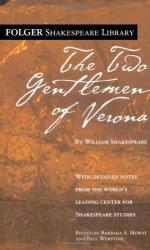|
This section contains 4,048 words (approx. 14 pages at 300 words per page) |

|
SOURCE: "The Two Gentlemen of Verona" in Realism in Shakespeare's Romantic Comedies: "O Heavenly Mingle, " University Press of America, 1980, pp. 51-66.
In this essay, Felheim and Traci survey the characters of The Two Gentlemen of Verona, maintaining that they embody the theme of change, especially in their soliloquies.
Proteus: Yet writers say: as in the sweetest bud
The eating canker dwells, so eating Love
Inhabits in the finest wits of all
(I. i. 42-44).
I
The theme of The Two Gentlemen of Verona centers in the idea of change, a concept embodied in the very name, Proteus, of one of the two gentlemen. When we first meet the young men, they are provincials, " . . . living dully sluggardiz'd at home" (I. i. 7), in Verona. And, as Valentine asserts, "Home-keeping youth have ever homely wits" (1. 2). His thesis is almost immediately demonstrated in the scene between Proteus and Speed (11. 70ff.) where the...
|
This section contains 4,048 words (approx. 14 pages at 300 words per page) |

|


